牛津译林版高中英语选修模块七 牛津英语模块七Unit2 Grammar教案-新版
牛津译林版高中英语选修模块七-牛津英语模块七Unit2-Reading教案-新版
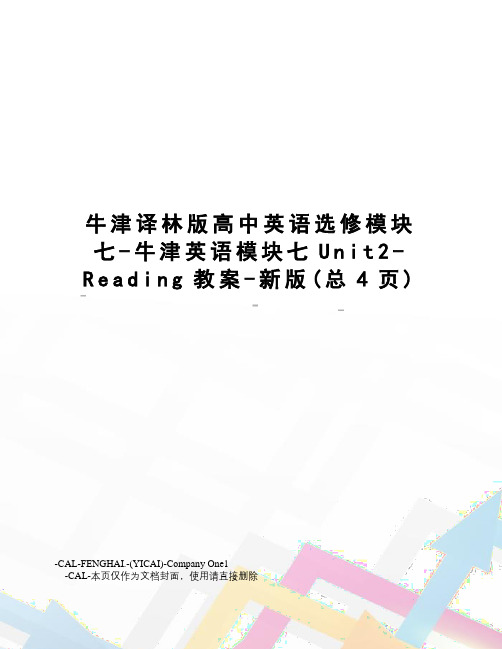
牛津译林版高中英语选修模块七-牛津英语模块七U n i t2-R e a d i n g教案-新版(总4页) -CAL-FENGHAI.-(YICAI)-Company One1-CAL-本页仅作为文档封面,使用请直接删除牛津英语模块七Unit2 Reading教案Step 1: Lead-inHave you ever taken medicines What medicines have you ever taken And what do you know about themPlease talk about your own experiences with medicines.Step 2: Fast reading for general ideasGo through the passage as quickly as possible and try to find answers to the three questions in part A on Page 18. Pay attention to the title so that you can identify the most important information as soon as possible.AnswersA 1. Aspirin and penicillin.2. In 1900.3. The Nobel Prize.Step 3: Detailed reading for important information1. Read the passage a second time and complete Part C1 and Part C2.AnswersC1 1. About 2,500 years ago.2. In 1897.3. It can also help reduce the risk of heart attacks by thinning blood, prevent a stroke, reduce the risk of colon cancer, increase the length of people’s lives and help with diabetes.4. In the mould that killed bacteria.2. Read the article again and fill in the form below so that you can understand the use of the two medicines introduced in the article.3. Pay attention to the medical terms in the reading passage. Underline the words and put them in correct categories.Step 4: Practice:1. Complete Part D. You may refer to the reading passage on pages 18 and 19 for some help.2. Part E i s about two entries in a children’s encyclopedia, one about aspirin and the other about penicillin. Please finish it.Step 5: Post-reading activities1. You will be divided into groups of four to introduce the development of aspirin and penicillin to other group members with the help of the timeline in Part C2.2. Search for more information about the scientists who have invented aspirin and penicillin. Give a brief introduction of the scientists.3. Read the instructions for Part F and discuss the questions listed.Step 6: Language points:Step 7: HomeworkPart A on page 114 and Part B on page 115 of the Workbook.。
英语译林牛津选修7Unit2学案4Grammar

英语译林牛津版选修7Unit 2学案(4)(Grammar)模块七Unit 2:Grammar and usage导学案M7U2 Grammar and usage【学习目标】:1. 学习动词短语的用法及区别。
2. 正确且熟练掌握和运用动词短语。
【学习重难点】: 1.学会辨别动词+副词与动词+介词的区别,正确熟练掌握动词短语的运用.2.熟练掌握并运用高考高频动词短语.教学过程: 熟练并正确运用动词短语(C级)一.短语动词的构成:英语中的动词,按其构成,可分为单词动词(single-word verb)和短语动词(phrasal verb).短语动词指由两个或两个以上单词构成的动词.这种动词主要有三种组合形式:(一) 动词+副词构成的动词短语:动词+副词构成的动词短语分为两类: “及物动词+副词”和“不及物动词+副词”. “及物动词+副词”短语的宾语既可以放在副词之前也可以放在副词之后, 但如果宾语为人称代词,则必须放在副词之前.Eg. 1. He took off his coat.2.Having worn his raincoat all the way, he took it off when he arrived at his office.3.Uncle Tom passed away (去世)many years ago.4.他进来时脱掉外套,出去时又穿上.He took off his coat when he entered the house and put it on again when he went out. (take off 是及物短语动词)5.There is often a spectators' balcony at airports, where people can watch the planes taking off and landing. (take off是不及物短语动词)6.His words puzzled me so much that I spent several minutes________________.A. making it upB. to make it upC. figured it outD. to figure it out总结:及物动词必须加宾语意思才完整的动词。
Unit2 Module7 学案 (译林牛津版高二英语选修七教案教学设计)
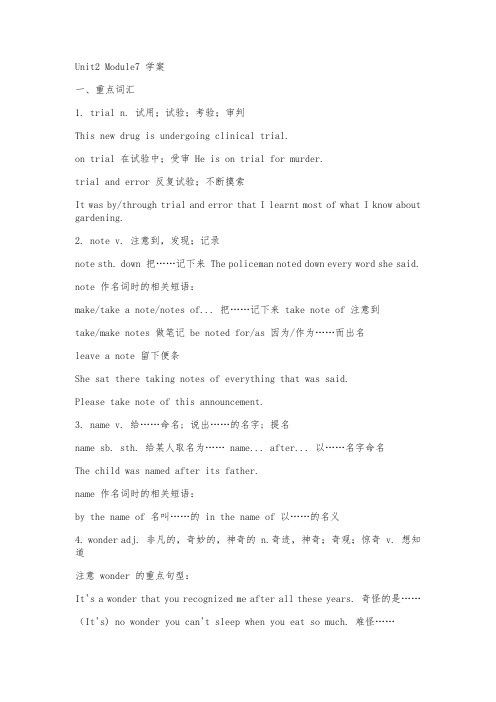
Unit2 Module7 学案一、重点词汇1. trial n. 试用;试验;考验;审判This new drug is undergoing clinical trial.on trial 在试验中;受审 He is on trial for murder.trial and error 反复试验;不断摸索It was by/through trial and error that I learnt most of what I know about gardening.2. note v. 注意到,发现;记录note sth. down 把……记下来 The policeman noted down every word she said.note 作名词时的相关短语:make/take a note/notes of... 把……记下来 take note of 注意到take/make notes 做笔记 be noted for/as 因为/作为……而出名leave a note 留下便条She sat there taking notes of everything that was said.Please take note of this announcement.3. name v. 给……命名; 说出……的名字; 提名name sb. sth. 给某人取名为…… name... after... 以……名字命名The child was named after its father.name 作名词时的相关短语:by the name of 名叫……的 in the name of 以……的名义4. wonder adj. 非凡的,奇妙的,神奇的 n.奇迹,神奇;奇观;惊奇 v. 想知道注意 wonder 的重点句型:It's a wonder that you recognized me after all these years. 奇怪的是……(It's) no wonder you can't sleep when you eat so much. 难怪……I was wondering whether/if I could borrow your car.5. relief n缓和,减轻 The pills gave her some relief.轻松,宽心 Hearing the news.,he breathed a sign of relief.救济物品,救济金 Relief was flown to the flood-hit areas.to one's (great) relief 使某人宽慰的是bring relief to sb. 给某人带来欣慰/解脱,减轻某人的痛苦relieve v. 减轻(病痛、忧虑、负担等),缓解;救济relieve pains/ anxiety/pressure/ traffic jams...relieve sb. of sth. 解除某人的负担责任等6. pleasure n.[u]愉快,高兴 He finds great pleasure in reading.[c]乐事;趣事 It is a pleasure to work with you.1) --- Thank you very much for your help.---(It's) My pleasure.2)---Could you help me with my English after school today?---With pleasure.7. point n. 点,位置;尖端;要点;分数point of view 观点on the point of 正要……的时候 She was on the point of going out when the telephone rang.to the point 中肯扼要;切中要害There is no point in doing sth. 做某事是没有用或意义的There is no point talking to her. She never listens.8. adj.life-saving 救命的 blood-thinning 稀释血液的 bacteria-killing 杀菌的二、重点难点语言点1. ASA could reduce the risk of colon cancer by 40 per cent.ASA可以降低40%的结肠癌发病率。
模块7 Unit 2 Project 教案(译林牛津版高二英语选修七教案教学设计)
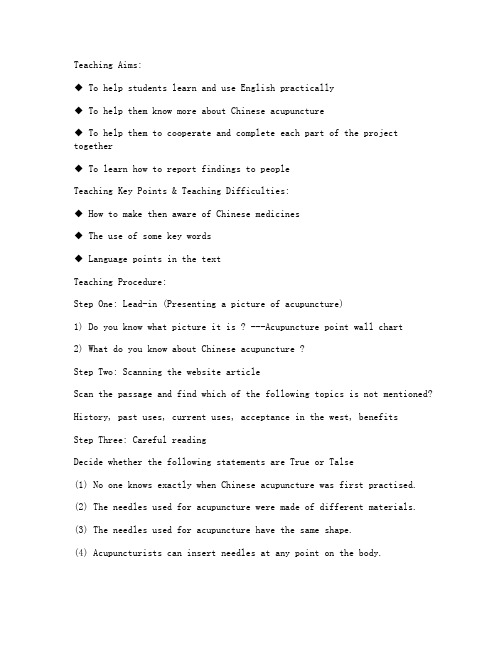
Teaching Aims:◆ To help students learn and use English practically◆ To help them know more about Chinese acupuncture◆ To help them to cooperate and complete each part of the project together◆ To learn how to report findings to peopleTeaching Key Points & Teaching Difficulties:◆ How to make then aware of Chinese medicines◆ The use of some key words◆ Language points in the textTeaching Procedure:Step One: Lead-in (Presenting a picture of acupuncture)1) Do you know what picture it is ? ---Acupuncture point wall chart2) What do you know about Chinese acupuncture ?Step Two: Scanning the website articleScan the passage and find which of the following topics is not mentioned?History, past uses, current uses, acceptance in the west, benefitsStep Three: Careful readingDecide whether the following statements are True or Talse(1) No one knows exactly when Chinese acupuncture was first practised.(2) The needles used for acupuncture were made of different materials.(3) The needles used for acupuncture have the same shape.(4) Acupuncturists can insert needles at any point on the body.(5) Experienced acupuncturists can find out which energy channel does not have enough energy by checking patients’ pulses.(6) Acupuncture can treat any medical problem.(7) Chinese traditional herbal medicine is not popular in the West.(8) There are still some disagreements about how acupuncture reduces and relieves pain.Step Four: Further reading1. Para1:began-the Stone Agehistory of Chinese acupuncture (magic needles) be practised-4,000yearsbe developed-2,000 years agoParas 2-3Para 41. How does an acupuncturist examine a patient?First ask the patient’s medical history and lifestyle. And then look at the color of the patient’s skin and tongue, listen to his breat hing and check his pulses.2. How many pulses are there and what are they connected with?There’re twelve different pulses, six on each wrist. Every one is connected with a major body organ or function of an organ.3. Why will an acupuncturist check pulses?This will help him/her find out which energy channel doesn’t have enough energy.4. What medical problems can acupuncture treat?Some of the medical problems that can be treated by acupuncture include very bad pain, such as neck and back pains, headaches, injuries, stomach problems and blood pressure problems. Some people have also usedacupuncture to treat addictions to cigarettes, drugs, alcohol and food (overeating).5. How does acupuncture reduce and relieve pain?Refer to the last paragraph of the article.Step Five: Language points1. approach ○1n.接近 At her approach the children ran off. 她走近的时候,孩子们都跑了。
牛津译林版七年级英语上册复习教案: Unit 2 Grammar 2
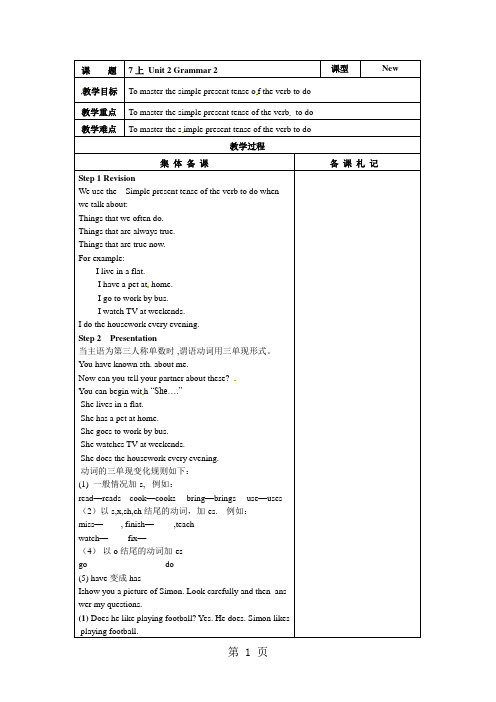
课题7上Unit 2 Grammar 2 课型New 教学目标To master the simple present tense o f the verb to do教学重点To master the simple present tense of the verb to do教学难点To master the s imple present tense of the verb to do教学过程集体备课备课札记Step 1 RevisionWe use the Simple present tense of the verb to do whenwe talk about:Things that we often do.Things that are always true.Things that are true now.For example:I live in a flat.I have a pet at home.I go to work by bus.I watch TV at weekends.I do the housework every evening.Step 2 Presentation当主语为第三人称单数时 ,谓语动词用三单现形式。
You have known sth. about me.Now can you tell your partner about these?You can begin wit h “She….”She lives in a flat.She has a pet at home.She goes to work by bus.She watches TV at weekends.She does the housework every evening.动词的三单现变化规则如下:(1) 一般情况加-s, 例如:read—reads cook—cooks bring—brings use—uses(2)以s,x,sh,ch结尾的动词,加-es. 例如:miss— , finish— ,teach--________watch— fix—(4)以o 结尾的动词加-esgo -- ______________ do -- ________________(5) have 变成hasIshow you a picture of Simon. Look carefully and then answer my questions.(1) Does he like playing football? Yes. He does. Simon likesplaying football.(2)Does he wear glasses? No, he doesn’t. Simon doesn’t wear glasses.(3)Pay attention to the underlined part and work out the rule(4) 当主语是第三人称单数(he, she, it)时,其否定句要借助于does not/ doesn’t,后面的动词用原形。
Module7Unit2生词讲解(Reading)(译林牛津版高二英语选修七教案教学设计)
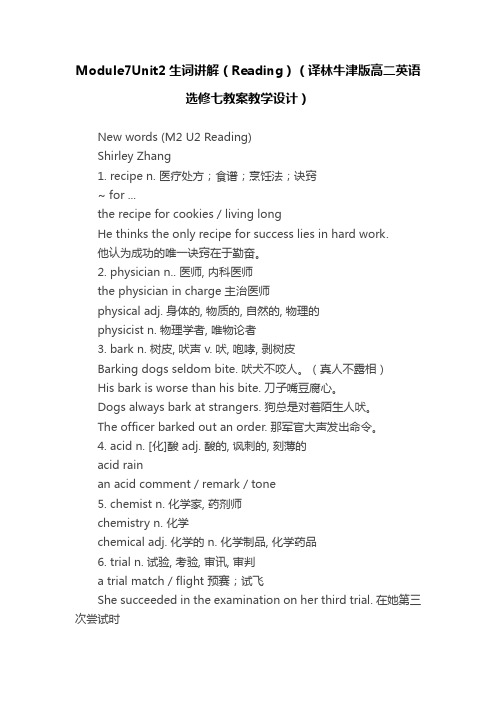
Module7Unit2生词讲解(Reading)(译林牛津版高二英语选修七教案教学设计)New words (M2 U2 Reading)Shirley Zhang1. recipe n. 医疗处方;食谱;烹饪法;诀窍~ for ...the recipe for cookies / living longHe thinks the only recipe for success lies in hard work.他认为成功的唯一诀窍在于勤奋。
2. physician n.. 医师, 内科医师the physician in charge 主治医师physical adj. 身体的, 物质的, 自然的, 物理的physicist n. 物理学者, 唯物论者3. bark n. 树皮, 吠声 v. 吠, 咆哮, 剥树皮Barking dogs seldom bite. 吠犬不咬人。
(真人不露相)His bark is worse than his bite. 刀子嘴豆腐心。
Dogs always bark at strangers. 狗总是对着陌生人吠。
The officer barked out an order. 那军官大声发出命令。
4. acid n. [化]酸 adj. 酸的, 讽刺的, 刻薄的acid rainan acid comment / remark / tone5. chemist n. 化学家, 药剂师chemistry n. 化学chemical adj. 化学的 n. 化学制品, 化学药品6. trial n. 试验, 考验, 审讯, 审判a trial match / flight 预赛;试飞She succeeded in the examination on her third trial. 在她第三次尝试时The man was on trial for killing a person. 此人因杀人而受审。
高中英语模块7二单元project教案牛津版选修七 教案

M7 U2 Project Exploring Chinese medicine南京九中吕若男Teaching Objectives:1. Students are expected to read a passage about Chinese acupuncture2. Improve students’ reading, speaking and thinking abilities.3. Enable students to prepare and present a dialogue and an oral report on Chinese medicine. Teaching Approaches:Task-based approachesForm of Activities:Individual, pair or group work and topic discussions.Teaching Aids:The multimedia and the blackboardTeaching Procedures:Step 1 Lead-in1. Freetalk: talking about getting ill and the hospitals the students prefer to go to when they are ill, which aims at introducing the topic of Chinese medicine.T: As we know, spring has come, and it’s a beautiful season. But in the season , people tend to get ill easily. Would you tell me which hospital in Nanjing would you prefer to go to ?S:…T: As for me, I prefer to go to Jiangsu Hospital of Chinese medicine. Do you know why? Because I have faith in Chinese medicine. It’s really safe and magic and has many special treatments, for example…(Showing a picture of acupuncture treatment on the screen and ask students a question) Q: What is happening to the person? (She is receiving an acupuncture treatment.)2. V ocabulary teaching: talking about 3 basic factors of acupuncture and study some key words related to understanding acupuncture and the passage.Blackboard: acupuncture, needle, point, pulse, energy channel, arrowhead, sword-likeStep 2 Reading1. Read Para 1 and 2 to find information about history and development of Chinese acupuncture and acupuncture needles.Ask students to read the part quickly and collect the information to fill in the chart above and check the answers with the whole class.2. Read aloud Para 3 together and find necessary information to finish the exercise about points.3. Read Para 4 to find relative information about checking pulse and the purpose of it.4. Read Para 5-6 to answer questions about functions of acupuncture and theory of the treatment.•Q1: What medical problems can acupuncture treat?•Q2:How does acupuncture reduce and relieve pain•A1: bad pains( such as neck and back pains), headaches, injuries, stomach problems and blood pressure problems.addictions to cigarettes, drugs, alcohol and food (overeating).•A2: blocks pain signals from reaching the spinal cordpromotes the production of chemicals in the body which reduce pain Step 3 FeedbackRetell what have been learnt about Chinese acupuncture with the assistance of key words.acupuncture•history•development•needles•points•pulses/ energy channel,•insert/symptom/swoll en…Step 4 Extension1.Discuss other branches of Chinese medicine and traditional Chinese treatment: showing pictures ofdifferent kinds of traditional Chinese treatment: cupping, Gua Sha treatment, massage,dietotheraphy, traditional Chinese herbal medicine.pare Chinese and western medicine (medical science)Key words: treatment, history, effect…3.Make up a dialogue between Steven and Li Hua talking about Chinese medicine, based on whathave been learnt about acupuncture and the discussion about Chinese medicine.Key words:•Acupuncture: history, needles, points, pulse, energy channel, insert,symptom, swollen, addictions, pain, relieve…•Branches: acupuncture / cupping(拔火罐) /Gua Sha treatment / massage (推拿) /traditional Chinese medicine (中药)•Differences from Western medicineStep 5 Homework1. Write an article about traditional Chinese medicine (one herb or treatment).2. Finish the exercises of this unit.。
牛津译林版高中英语选修七Module 7 Unit 2 Exercise for grammar

高中英语学习材料(灿若寒星*制作整理)Module 7 Unit 2 Exercise for grammar1. We thought of selling this old furniture, but we’ve decided to _____ it. It might be valuable. (02全国) A. hold on to B. keep up with C. turn to D. look after2. Can you make a sentence to _____ the meaning of the phrase? (02上海)A. show offB. turn outC. bring outD. take in3. His mother had thought it would be good for his character to _____ from home and earn some money on his own. (02北京)A. run awayB. take awayC. Keep awayD. get away4. The idea puzzled me so much that I stopped for a few seconds to try to ___. (03北京春)A. make it outB. make it offC. make it upD. make it over5. New reports say peace talks between the two countries have ____ with no agreement reached. (03全国) A. broken down B. broken out C. broken in D. broken up6. Don’t mention that at the beginning of the story, or it may ____ the shocking ending. (03北京)A. give awayB. give outC. give upD. give off7. The engine of the ship was out of order and the bad weather ____ the helplessness of the crew at sea. (03上海) A. added to B. resulted from C. turned out D. made up8. It was foolish of him to ____ his notes during that important test, and as a result, he got punished. (04上海春) A. stick to B. refer to C. keep to D. point to9. We are going to ____ with some friends for a picnic. Would you like to join us? (04全国春)A. get inB. get overC. get alongD. get together10. He was in hospital for six months. He felt as if he was ____from the outside world. (04全国春) A. cut out B. cut off C. cut up D. cut through11. You can take anything from the shelf and read, but please _____ the books whe n you’ve finished with them. (04全国) A. put on B. put down C. put back D. put off12. I don’t ____ rock’n’roll. It’s much too noisy for my taste. (04北京)A. go afterB. go away withC. go intoD. go in for13. It was not a serious illness, and she soon ____ it. (04天津)A. got overB. got on withC. got aroundD. got out of14. To keep healthy, Professor Johnson ____cycling as a regular form of exercise after he retired. (04上海) A. took up B. caught on C. carried out D. made for15. Before the war broke out, many people ____ in safe places possessions they could not take with them. (04重庆) A. threw away B. put away C. gave away D. carried away16. Helen always helps her mother even though going to school ____ most of her day. (04广东)A. takes upB. makes upC. saves upD. puts up17. It is certain that he will ____ his business to his son when he gets old. (04福建)A. take overB. think overC. hand overD. go over18. We wanted to get hom e before dark, but it didn’t quite ____ as planned. (04浙江)A. make outB. turn outC. go onD. come up19. It’s ten years since the scientist ____ on his life’s work of discovering the valuable chemical. (04江苏) A. made for B. set out C. took off D. turned up20. ---____for the glass! (04湖南) ---It’s OK. I’m wearing shoes.A. Look outB. Walk outC. Go outD. Set out21. Could you please tell me where you bought the shoes you ____ yesterday? (05辽宁)A. tried onB. put onC. had onD. pulled on22. He accidentally ____ he had quarreled with his wife and that he hadn’t been home for a couple of weeks. (04湖南) A. let out B. took care C. made sure D. made out23. We have to ____ the wheat as soon as possible because a storm is on the way. (04湖北)A. get awayB. get acrossC. get throughD. get in24. Once a decision has been made, all of us should ____ it. (04湖北)A. direct toB. stick toC. lead toD. refer to25. The final exa mination is coming up soon. It’s time for us to ___ our studies. (04辽宁)A. get down toB. get outC. Get back forD. get over26. In some western countries, demand for graduates from MBA courses has ____. (04广西)A. turned downB. turned overC. fallen downD. fallen over27. The forest guards often find campfires that have not been ____ completely. (04吉林)A. turned downB. put outC. put awayD. turned over28. It’s the present situation in poor areas that ___ much hi gher spending on education and training. (05北京) A. answers for B. provides for C. calls for D. plans for 29. His idea of having weekly family meals together, which seemed difficult at first, has ___ many good changes in their lives. (05重庆)A. got throughB. resulted fromC. turned intoD. brought about30. John is leaving for London tomorrow and I will ____ him ____ at the airport. (05广东)A. send…awayB. leave…offC. see…offD. show…around31. This dictionary is being printed and it will soon ____ . (05福建)A. turn outB. come outC. start outD. go out32. I was just talking to Margaret when Jackson ____. (05湖南)A. cut inB. cut downC. cut outD. cut up33. To understand the grammar of the sentence, you must break it ___ into parts. (05湖北)A. downB. upC. offD. out34. This picture was taken a long time ago. I wonder if you can ____ my father. (05湖北)A. find outB. pick outC. look outD. speak out35. Please tell me how the accident __. I am still in the dark. (05江西)A. came byB. came uponC. came toD. came about36. The president spoke at the business meeting for nearly an hour without ____ his notes. (05浙江) A. bringing up B. referring to C. looking for D. trying on37. I couldn’t _____. The line was busy. (05浙江)A. go byB. go aroundC. get inD. get through38. Kathy ____ a lot of Spanish by playing with the native boys and girls. (05安徽)A. picked upB. took upC. made upD. turned up39. Everybody in the village likes Jack because he is good at telling and ____ jokes. (05江苏)A. turning upB. putting upC. making upD. showing up40. What shall we use for power when all the oil in the world has ____? (05山东)A. given outB. put outC. held upD. used up。
牛津译林版高中英语选修7复习教案模块七Unit 2 Fit for life牛津译林版

Module 7 Unit 2 新课标单词historian n. 历史学家recipe n. 处方;食谱,菜谱physician n. 医生,内科医师bark n. 树皮;(狗)叫,吠vi. (狗)叫,吠chemist n. 药剂师;化学家trial n. 试用;试验;考验tablet n. 药片;写字板,书写板standardize vt. 使符合标准,使标准化best-selling adj. 畅销的painkiller n. 止痛药,镇痛剂author n. 作者heart attack 心脏病发作thin vt. & vi. (使)变稀,(使)变薄,(使)变淡;(使)变细block vt. 阻塞,阻挡,使不通;妨碍length n. 长度contemporary adj. 当代的;同时代的Scottish adj. 苏格兰的note vt. 发现,注意到;记录transparent adj. 透明的application n. 应用,运用;申请name vt. 命名,给……取名unable adj. 不能的,不会的chemical adj. 化学的purify vt. 使纯净,净化,提纯quantity n. 量,数量mass adj. 批量的,大量的,大规模的;群众的,民众的n. 团,块,堆;较大部分,主体部分;体积,大小,群众,人群widespread adj. 普遍的,普及的,广泛的lung n. 肺rapidly adv. 迅速地,快速地powerful adj. 效力大的,强效的wonder adj. 非凡的,奇妙的,奇特的,神奇的n. 奇迹,神奇;奇观;惊奇,惊讶millions of 数百万的,大量的relief n. 减轻,缓解;轻松,宽慰;救济,救助potential adj. 潜在的,可能的fundamental adj. 基础的,根本的;重要的,至关重要的enquiry n. 询问,咨询ward n. 病房handful n. 少数,少量;一把annual adj. 每年的,一年一次的arrangement n. 安排;排列receptionist n. 接待员,招待员pleasure n. 愉快,快乐;乐事eyesight n. 视力adjustable adj. 可调节的magic adj. 有魔力的,不可思议的,魔术的needle n. 针art n. 技艺,技术sharp-edged adj. 有锋利边缘的swollen adj. 肿胀的arrowhead n. 箭头;箭头状物sharp adj. 锋利的,锐利的;尖的;突然的,急转向的;尖刻的,辛辣的;灵敏的,敏锐的fine adj. 细的,纤细的point n. 点,位置;尖端;要点;分数insert vt. 插入;嵌入symptom n. 症状function n. 功能,作用heartbeat n. 心跳addiction n. 上瘾,沉溺,入迷overeating n. 过量饮食relieve vt. 减轻(病痛、忧虑、负担等),缓解;救济,救助unclear adj. 不清楚的课文出现短语1. keep us healthy2. open up3. carry out4. give up5. come true6. figure out7. go wrong8. put off9. put up with10. make out11. call back12. look out for13. at certain points14. find out15. if so16. recommend doing17. in contemporary society 18. in large quantities19. trun into20. be fundamental to (doing)21. a disease called malaria22. look into23. look down upon24. put through25. come up26. remind sb to do27. be based on28. block from doing29. focus on30. reduce the risk of31. try out32. due to33. in addition to34. have an influence on35. leave behind36. ask for37. set up38. put off 39. take measures to do40. let … out of41. be connected with一.单词应用根据单词的首字母或汉语意思填写正确单词,注意形式变化。
Unit 2 of Module 7 Language points (译林牛津版高二英语选修七教案

Unit 2 of Module 7 Language points (译林牛津版高二英语选修七教案教学设计)Unit 2 of Module 7 Language points班级姓名学号时间评价Learning Aims:1. To learn some language points in this text to enlarge the vocabulary2. To use the language points when doing the exercises. Learning Important and Difficult Points:1. Learn to analyze some long and complicated sentences. Learning Methods:1. Learn some phrases by heart.2. Learn the usage of some words and phrases throughself-study and practice.Learning Procedures:第一部分:自主探究Ⅰ. 识记短语1. focus on 聚焦于;集中留意力2. open up 打开;开拓3. save on e’ life 挽救某人的生命4. recommend doing sth. 建议做某事5. take place 发生6. reduce the risk of 减小… 损害7. carry out 实施,进行 8. in contemporary society 在当代9. increase the length of people’ lives 延长人类寿命10. increase the standard of people’s healt h 提高人类的健康水平11. try … out on 在… 上试用某物 12. make it pure 提纯13. manage to do 胜利做成某事 14. in large quantities 大量地15. due to 由于 16. widespread use of 广泛使用17. turn … into 把… 变成 18. wonder drug 奇妙药品II. 重点单词、词组或句子用法探究1. If you open up any medicine cupnoard in the world, there is a high probability that you will find aspirin and penicillin.请问这是一个简洁句还是复合句__复合句____________ ?这是if 引导的 _条件状语从句, 主句中的that 引导的是____同谓语_______ 从句,用来解释说明___ probability ________ 的内容,在句子中充不充当成分? ___不________________ 。
牛津译林版高中英语选修模块七-牛津英语模块七Unit2-Task教案-新版
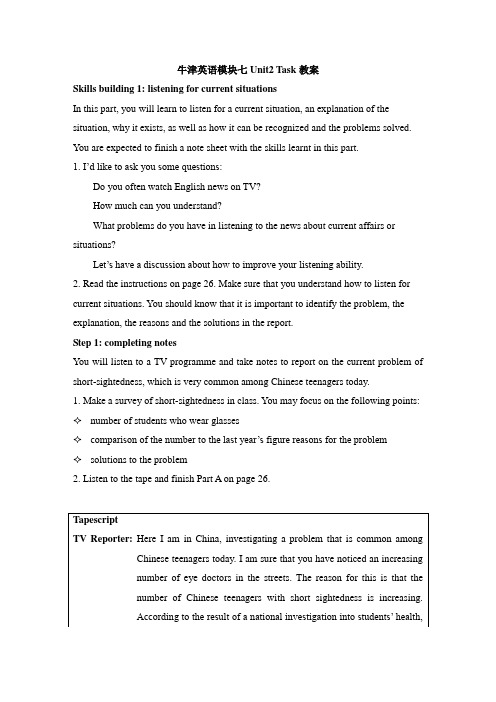
牛津英语模块七Unit2 Task教案Skills building 1: listening for current situationsIn this part, you will learn to listen for a current situation, an explanation of the situation, why it exists, as well as how it can be recognized and the problems solved. You are expected to finish a note sheet with the skills learnt in this part.1. I’d like to ask you some questions:Do you often watch English news on TV?How much can you understand?What problems do you have in listening to the news about current affairs or situations?Let’s have a discussion about how to improve your listening ability.2. Read the instructions on page 26. Make sure that you understand how to listen for current situations. You should know that it is important to identify the problem, the explanation, the reasons and the solutions in the report.Step 1: completing notesYou will listen to a TV programme and take notes to report on the current problem of short-sightedness, which is very common among Chinese teenagers today.1. Make a survey of short-sightedness in class. You may focus on the following points:✧number of students who wear glasses✧comparison of the number to the last year’s figure reasons for the problem✧solutions to the problem2. Listen to the tape and finish Part A on page 26.the short sightedness rate for Chinese primary school students is twenty-two point eight percent. Among junior high school students the number increases to fifty-five point two percent, and by the time students get to senior high school, seventy point three percent of them need to wear glasses. Figures in other cities show this increase. Let’s take Taiyuan in Shanxi Province for example. In two years the number of junior high school students with short-sightedness in Taiyuan, Shanxi Province increased from sixty-one point three to sixty-four point two percent, and for primary school students, the number increased from twenty-one point five to thirty-two percent. These high figures worry both teachers and doctors. But first, what exactly is short-sightedness? Short-sightedness is caused when the eye is unable to focus on distant objects. This results in an unclear image. Short-sightedness can usually be corrected with glasses or contact lenses, or, in some cases, with laser eye surgery. Contact lenses, which rest on the eye, and laser eye surgery, which changes the eye itself, both involve directly touching the eye. Therefore, it is recommended to wait until adulthood to get contact lenses or to have laser eye surgery because by then the eyes are less likely to change. The question is, why do so many children in China suffer from this problem? It is a question that I asked Dr Li, an expert on the problem. He said that many schools encouraged students to do a lot of reading as homework, but this is not actually the problem. The problem is that many students read in bed, and very often their rooms are not well-lit. He said there is growing concern, among teachers and doctors, at the number of children who are becoming short-sighted. Teachers and doctors think that parents and students need more information on the problem so that they understand how their eyes can be protected. The problems is that if the short-sightedness is not discovered and dealt with, then the children’s3. Read the instructions of Part B on page 27. You will be divided into groups of four and finish the notes by putting the measures under the correct school. You may have a competition.4. Read the instructions in Part B and finish the chart on page 27. You may work in pairs.5. Listen to the radio announcement in Part C and fill in the missing information in the table.Skills building 2: interviewing someoneThis part aims to help you conduct an interview. You will learn how to structure and organize your interview and questions.1. Go over the instructions on top of page 28. Make sure you understand what each point is about. Make sentences after examples provided. You may discuss and suggest more ways to give self-introduction and to start to ask the questions.2. Listen to an interview and pay attention to the language the interviewer and interviewee use. You will notice there are some sentences that have not been covered in this part. Write these sentences on the margin of your book and then use them in your own interview.Step 2: interviewing a doctorThis part is designed to train your speaking skill. By interviewing a doctor, you willapply what you have learnt in Skills building 2 to find out more ways to protect eyesight.1. Discuss solutions to protecting eyesight in groups. List as many solutions as possible.2. Go through the sentences structures in the left box and the solutions in the right box on page 28. You should understand each suggestion. Then work in pairs. One acts as the doctor and the other as the reporter. When you finish the interview, you should change roles.Skills building 3: writing a radio scriptIn this part, you will read about how to write a radio script and how to organize information for a report properly.1. Read the instructions at the top of page 29. Try to understand what should be included in script.2. Read the points one by one and make a sentence for each point. In this way, you will know how to write a radio script. For example:✧who you areThis is (your own name), who will talk about what our school has decided to do in order to protect our eyesight✧the subjectWhat I’m going to talk about in this programme is about what should be done at home to protect our eyesight.✧the openingHi, everyone. It is the news time now.✧explanation of what the topic isThe topic today is what we can do to protect our eyesight.✧background information, including the current situationWe can find that more and more teenagers are wearing or need to wear glasses so that they can see clearly. In our school, the number of students who are short-sighted is also increasing.✧reference to other sourcesThe reporters of our school radio station have interviewed a famous eye doctor in No. 1 People’s Hospital. The doctor has given some advice on how to protect our eyesight. They also have talked with the headmaster of our school to ask what the school will do to solve the problem.✧recommendationsThe d octor suggests that we should…The headmaster says that our school will…✧closingThank you for listening to my report.Step 3: writing a report for the school radio stationIn this part, you are required to write a radio script for a programme on short-sightedness for the school radio station. The script is based on the information you have collected in Steps 1 and 2. You are expected to practice the skills you have learnt in the previous Skills building parts.1. Read the instructions in Step 3. So you can learn that you are going to write a report about short-sightedness with the information you gathered in Steps 1 and2. Review the results you have collected and the main points you need to include in writing a script.2. Work in groups of four to write an outline. You may refer to the structure of the report you organized in Skills building3.3. Write a script in small groups. Each member should be responsible for a part of the script.。
高中英语 Unit2 Grammar and usage教案 牛津译林版选修7-牛津版高二选修7英语

Unit 2Fit for lifeGrammar and usageTeaching aims:1. After learning Linking verbs, the students will know about some basic information about linking verbs(words used as linking verbs; function of linking verbs; predicative after linking verbs);2. After learning Linking verbs, the students willbe able to summarize usages of mon and important linking verbs;3. After learning Linking verbs, the students will apply what they’ve learnedabout linking verbs.Teaching procedures:Step 1 Lead-in (PPT4)Q: What is a linking verb?A: A linking verb is a word used to connect the subject of a sentence to further information about the state which the subject is in.Step 2 Introduction(PPT5)Point out the linking verbs1. I am Zhu Zhenfei.2. Surfing the Internet is really interesting.3. We are now in need of English teachers.4. The question is how to solve the problem.5. What we want to know is who will give us the lecture next Monday.6. Your suggestion sounds reasonable.7. It seems that everyone here knows him quite well.8. Milk goes bad easily in summer if you do not put it in the fridge.Step 3 Presentation(PPT6-13)连系动词(即系动词)用于连接主语和表语,说明主语的状态、性质、特征或身份。
牛津泽林版高中英语选修七 - Unit2 教学设计-精品教案(推荐)
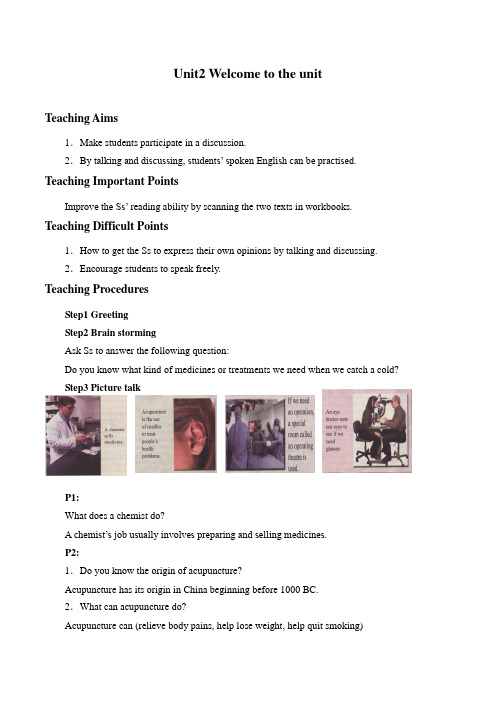
Unit2 Welcome to the unitTeaching Aims1.Make students participate in a discussion.2.By talking and discussing, students’ spoken English can be practise d. Teaching Important PointsImprove the Ss’ reading ability by scanning the two texts in workbooks. Teaching Difficult Points1.How to get the Ss to express their own opinions by talking and discussing.2.Encourage students to speak freely.Teaching ProceduresStep1 GreetingStep2 Brain stormingAsk Ss to answer the following question:Do you know what kind of medicines or treatments we need when we catch a cold?Step3 Picture talkP1:What does a chemist do?A chemist’s job usually involves preparing and selling medicines.P2:1.Do you know the origin of acupuncture?Acupuncture has its origin in China beginning before 1000 BC.2.What can acupuncture do?Acupuncture can (relieve body pains, help lose weight, help quit smoking)P3:What are they doing? The doctors are performing an operation. During the process of an operation, the surgeons c ut open a part of a person’s body and remove or repair a damaged part.P4:1.Do you have good eyesight?2.How can you protect your eyes?Step4 Discussion1.Have you ever seen a doctor? If so, what happened?2.Would you like to do any of the jobs shown in the picture? Why or why not?Step5 Reading (workbook)Ask Ss some questions1.Have you ever heard of a kind of terminal diseases called smallpox? What do you know about it? Is it deadly now? Why or why not?2.Can you name some other deadly diseases?Then ask the Ss to read passage A to answer the questions.1.Do you like drinking milk?2.How often do you drink milk?3.What kind of milk do you like?4.Do you know how to let milk stay fresh?Make the Ss go through passage B to answer the question.Ask the Ss to find out some language points in each paragraph.1.be deadly to2.in the late 1700s3.bring...under control4.try an experiment on sb.5.become ill6.fight diseaseStep6 Homework1.Read the two passages once more.2.Preview the reading passage.Thoughts on Design本节课以说、读为主,是一节导入课。
牛津译林版七年级英语上册Unit-2 grammar语法课时教案
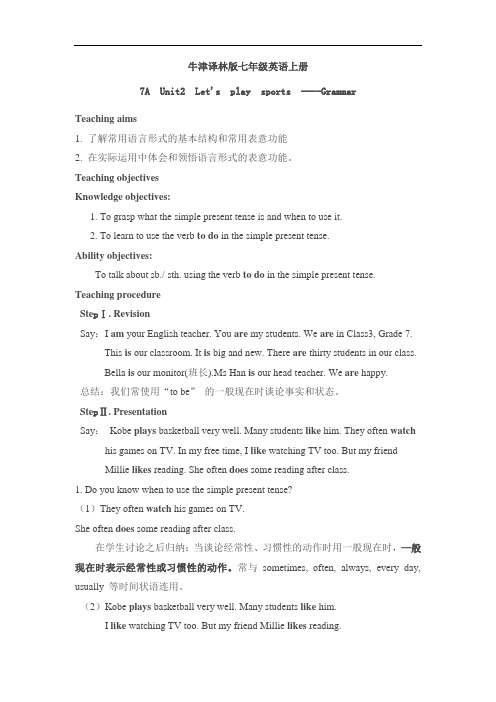
牛津译林版七年级英语上册7A Unit2 Let's play sports ----GrammarTeaching aims1.了解常用语言形式的基本结构和常用表意功能2.在实际运用中体会和领悟语言形式的表意功能。
Teaching objectivesKnowledge objectives:1. To grasp what the simple present tense is and when to use it.2. To learn to use the verb to do in the simple present tense.Ability objectives:To talk about sb./ sth. using the verb to do in the simple present tense. Teaching procedureSte pⅠ. RevisionSay:I am your English teacher. You are my students. We are in Class3, Grade 7.This is our classroom. It is big and new. There are thirty students in our class.Bella is our monitor(班长).Ms Han is our head teacher. We are happy.总结:我们常使用“to be”的一般现在时谈论事实和状态。
Ste pⅡ. PresentationSay:Kobe plays basketball very well. Many students like him. They often watch his games on TV. In my free time, I like watching TV too. But my friendMillie likes reading. She often does some reading after class.1. Do you know when to use the simple present tense?(1)They often watch his games on TV.She often does some reading after class.在学生讨论之后归纳:当谈论经常性、习惯性的动作时用一般现在时,一般现在时表示经常性或习惯性的动作。
译林版模块7Unit2课文语言点学案(译林牛津版高二英语选修七学案设计)
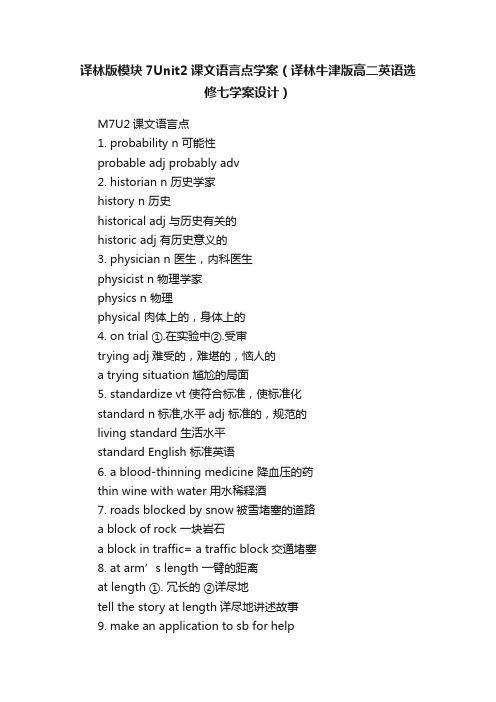
译林版模块7Unit2课文语言点学案(译林牛津版高二英语选修七学案设计)M7U2课文语言点1. probability n 可能性probable adj probably adv2. historian n 历史学家history n 历史historical adj 与历史有关的historic adj 有历史意义的3. physician n 医生,内科医生physicist n 物理学家physics n 物理physical 肉体上的,身体上的4. on trial ①.在实验中②.受审trying adj难受的,难堪的,恼人的a trying situation 尴尬的局面5. standardize vt 使符合标准,使标准化standard n标准,水平adj 标准的,规范的living standard 生活水平standard English 标准英语6. a blood-thinning medicine 降血压的药thin wine with water 用水稀释酒7. roads blocked by snow被雪堵塞的道路a block of rock 一块岩石a block in traffic= a traffic block交通堵塞8. at arm’s length 一臂的距离at length ①. 冗长的②详尽地tell the story at length详尽地讲述故事9. make an application to sb for help请求某人帮助apply to sb for help 请求某人帮助apply a theory to practice把理论用于实践apply oneself to one’s job致力于本职工作10. purify vt purify the water 使水净化purity n纯净,纯洁pure adj 纯净的11. be fundamental to (doing)sth对(做)某事是至关重要的12. arrange for sb to do sthmake arangements for sb to do sth安排某人做某事arrange that sb (should) do sth13. take (a) pleasure in 以。
- 1、下载文档前请自行甄别文档内容的完整性,平台不提供额外的编辑、内容补充、找答案等附加服务。
- 2、"仅部分预览"的文档,不可在线预览部分如存在完整性等问题,可反馈申请退款(可完整预览的文档不适用该条件!)。
- 3、如文档侵犯您的权益,请联系客服反馈,我们会尽快为您处理(人工客服工作时间:9:00-18:30)。
牛津英语模块七Unit2 Grammar教案Step 1: General introductionThe grammar item in this unit focuses on phrasal verbs. You will learn that a phrasal verb is made up of a verb plus an adverb or a preposition. You will also learn some rules to use phrasal verbs. You are expected to apply what you have learnt to practical use by finishing a conversation and a word game.Step 2: Explanation:1. Look at the following sentences. Compare them and tell the part of speech of each underlined word.He looked around and saw nothing.She is looking after the old lady carefully.In the two sentences, around is an adverb while after is a preposition.She was so ill that it seemed unlikely that she would pull through.He has gone through a difficult time recently.Here the first through is an adverb while the second through is a preposition. So we know an adverb or a preposition is used to make up a phrasal verb.2. Read the instructions and examples on the top of page 24. Point out the phrasal verb in each sentence. You will be divided into groups of four and find as many phrasal verbs in the reading passage as possible. Read the sentences you have found and make sure you know how these phrasal verbs are used.1) This article will focus on….2) If you open up any medicine…3) … d rinking a tea made from…4) … other things that aspirin can help with.5) …a study carried out in the USA.6) Fleming tried this mould out…7) Fleming did not give up.8) Many people would have died from….9) … before someone else turned penicillin into…3. Read Part 1 on page 24. You should know that the adverb can go before or after theobject in a phrasal verb. For example:Please look the word up in the dictionary.Please look up the word in the dictionary.They put on their safely helmets before starting to work.They put their safety helmets on before starting to work.4. Read Part 2, Part 3 and the example sentences. You should know a phrasal verb does not always have an object. The object always comes after the preposition in a phrasal verb with a preposition. Compare the following sentences.The special train pulled in at 9 a. m.Prices of vegetables have gone up recently.I called you several times last night, but I couldn’t get through.If you act like this, you will get into trouble.The policemen are looking into a case.The rubbish gave off a terrible smell.5. Look at Part 4. Sometimes we can add a preposition after the adverb in a phrasal verb. For example:I can’t put up with him any longer.I am looking forward to hearing from her.She often looks back upon her bitter life in the old society.6. Look at Part 6. Try to understand the meaning of the phrasal verb ‘make out’. Many phrasal verbs have more than one meaning. Do you know the meanings of the phrasal verbs in the following sentences?1) His accent gives him away as a southerner.2) He gave away most of his money to charity.3) They gave away their last chance of winning the match.4) The mayor gave away the prizes at the school sports day.5) She took me in completely with her story.6) He was homeless, so we took him in.7) Fish take in oxygen through their gills.8) I hope you’re taking in what I’m saying.9) S he pays the bills by taking in washing.Step 3: Practice:1. Do Part A in pairs.2. Finish Part B on page 25.Step 4: Consolidation:I. Multiple choice:1. The world is ______ seven continents and four oceansA. made up ofB. made out ofC. made fromD. made in2. I really don't want to go to the party, but I don't see how I can ______it.A. get back fromB. get out ofC. get awayD. get off3. You'd better ___________ some money for special use.A.pick up B.set aside C.put off D.give away4. Can you make a sentence to _____the meaning of the phrase?A show offB turn outC bring outD take in5. You can take anything from the shelf and read, but please _______the books when you' ve finished with them.A. put onB. put downC. put backD. put off6. The final examination is coming up soon. It’s time for us to our studies. A.get down to B.get out C.get back for D.get over7. It’s ten years since the scientist _______on his life's work of discovering the valuable chemical.A. made forB. set outC. took offD. turned up8. The forest guards often find campfires that have not been ______ completely.A. turned downB. put outC. put awayD. turned over9. He accidentally _____he had quarreled with his wife and that he hadn't been home for acouple of weeks.A. let outB. took careC. made sureD. made out10. --- ______ for the glass!--- It's OK. I'm wearing shoes.A. Look outB. Walk outC. Go outD. Set out11. Unfortunately, not everyone has realized the important part the balance of nature_____ their daily life.A. plays inB. playingC. plays ofD. to play in12. The students studied hard. They were _____ for knowledge.A. worryB. worriedC. eagerD. curious13. She devoted herself _____ the problems of the teenagers.A. in studyingB. at studyingC. to studyD. to studyingII. Translation:1. 当他年纪大了,他一定会把他的生意移交给他儿子的。
